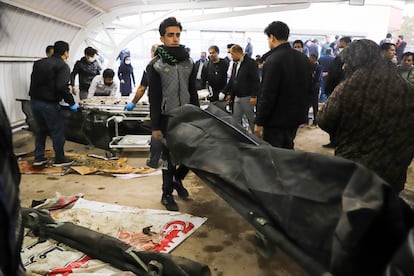The attack in Iran and its relationship with the Gaza war
It is likely that Iran will prefer to handle the media impact of the massacre as an internal matter and not add more tension to its confrontation with Israel

The explosions that left at least 84 people dead and nearly 280 wounded on Wednesday in Kerman in southern Iran pose important questions given the context of regional tension stemming from the war in Gaza and the Iranian regime’s own internal dynamics against opposition groups.
Although Islamic State — Khorasan Province (ISIS-K) claimed responsibility for the attack, it is worth reflecting on the strategic intent of the explosions on a day as important to the Islamic Republic of Iran as the commemoration of General Qassem Soleimani’s death. Taking place on this date, and in a place close to the general’s tomb, sends a very powerful deterrent message to Iran and its allies, as this annual ceremony not only gathers together officers of the Revolutionary Guard, but also members of different groupings of the so-called Axis of Resistance who travel to Iran from Iraq, Lebanon, Yemen, and Syria through their links, in one way or another, to the asymmetrical war architecture designed by Soleimani during years of military advising through the elite Al Quds force.
A second reflection is that the explosions in Kerman came a day after Israel assassinated Saleh al-Arouri — the main link between Iran and Hezbollah — in Beirut, nine days after the death in Syria of Sayyed Razi Mousavi — the Iranian advisor who coordinated the military alliance between Damascus and Tehran — and on the same day that Israel attacked the Naqoura area in southern Lebanon, killing nine more Hezbollah officials. This could indicate that, even if ISIS-K had planned the attack in Kerman in advance and without knowledge of Israeli plans, the consummation of what happened in Lebanon and Syria directly and drastically increased the media impact of what happened in Kerman in the regional and international sphere, a common goal in organizations like this one. It thus succeeded in sowing confusion in Iran’s intelligence and security apparatus, whose high-ranking officers have been concentrating on Gaza.
A third reflection points to the political agenda of ISIS-K and other armed groups with which it collaborates, which combine different types of nationalism with Islamic extremism. Of particular note are Jundullah, whose leader, Salahuddin Farooqui, has historically opposed Iranian support for Syria; or groups such as Jaish ul-Adl, which aims to establish a Baloch nation in Iran and whose leaders yearn for revenge against the government of the Islamic Republic after it publicly executed three of its members in November 2023 on charges of “acts of terrorism” and “collaboration with foreign agencies.”
It is likely that the attack in Kerman can also be connected to the agenda that Tehran historically carries against these separatist groups, which it links to ISIS-K itself as they often operate in a shared territory in southern Iran, leading them to employ conjunctural rapprochements. Moreover, it should not be forgotten that ISIS-K claimed responsibility for a similar attack on the Shah Cheragh shrine in Shiraz in October 2022, using similar methods of mass shootings and suicide attacks.
Given this, it should be noted that ISIS-K suffered significant casualties in 2023, which could have led it to plan a response in the current context. ISIS-K losses were due to cooperation between Iran and the Afghan Taliban government, which have jointly engaged ISIS-K along the Iran-Afghanistan border.
Given the context of tension in southern Lebanon, the Red Sea, Syria, Iraq, and Afghanistan, the question remains as to how Iran will respond to the assassination of its representatives in Damascus, and not so much to the attack in Kerman. While it is necessary to await Tehran’s official response after the investigation, ISIS-K’s claim of responsibility somewhat assuages Tehran’s dilemma of responding to the attack by looking to Israel. It is likely that Iran would prefer to handle the media impact of Kerman as an internal matter and not escalate the conflict in Gaza, which continues to open new fronts, of which Iran does not aspire to be one.
Sign up for our weekly newsletter to get more English-language news coverage from EL PAÍS USA Edition
Tu suscripción se está usando en otro dispositivo
¿Quieres añadir otro usuario a tu suscripción?
Si continúas leyendo en este dispositivo, no se podrá leer en el otro.
FlechaTu suscripción se está usando en otro dispositivo y solo puedes acceder a EL PAÍS desde un dispositivo a la vez.
Si quieres compartir tu cuenta, cambia tu suscripción a la modalidad Premium, así podrás añadir otro usuario. Cada uno accederá con su propia cuenta de email, lo que os permitirá personalizar vuestra experiencia en EL PAÍS.
¿Tienes una suscripción de empresa? Accede aquí para contratar más cuentas.
En el caso de no saber quién está usando tu cuenta, te recomendamos cambiar tu contraseña aquí.
Si decides continuar compartiendo tu cuenta, este mensaje se mostrará en tu dispositivo y en el de la otra persona que está usando tu cuenta de forma indefinida, afectando a tu experiencia de lectura. Puedes consultar aquí los términos y condiciones de la suscripción digital.








































